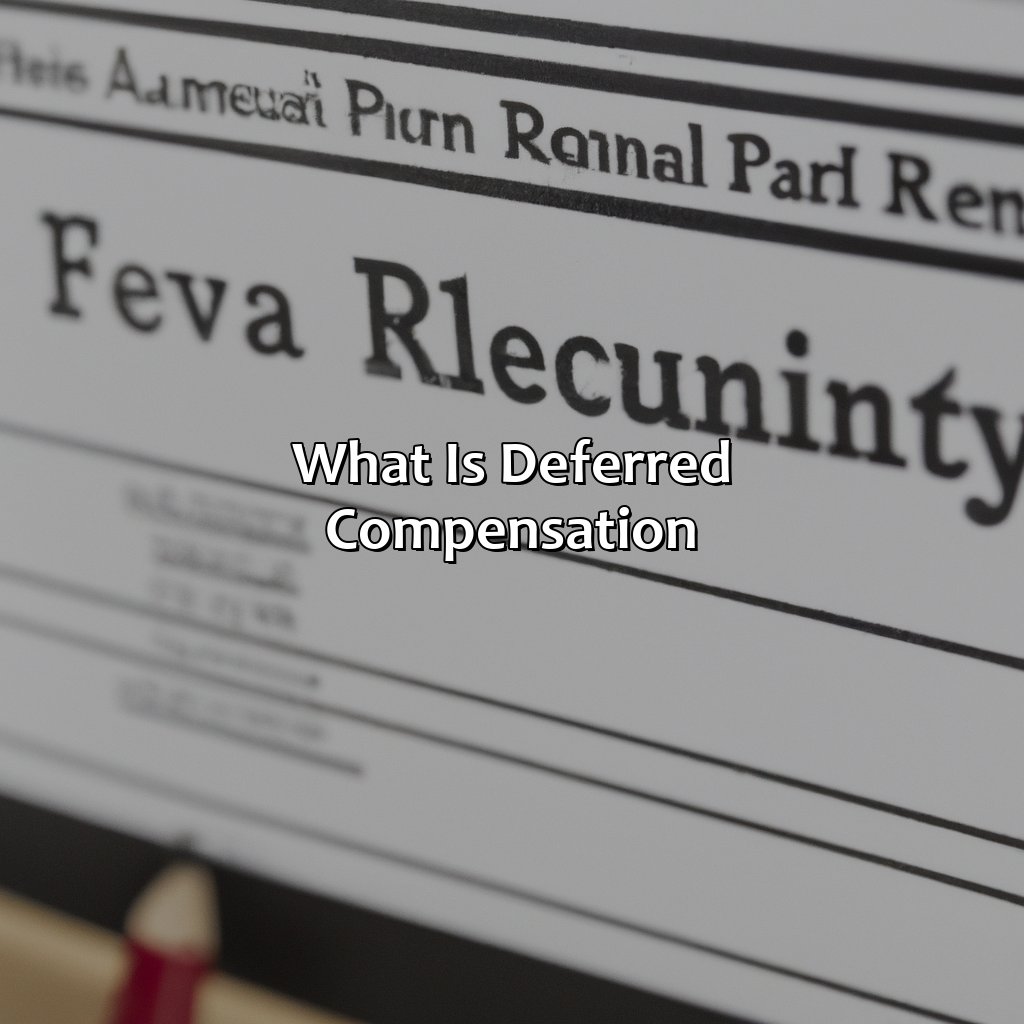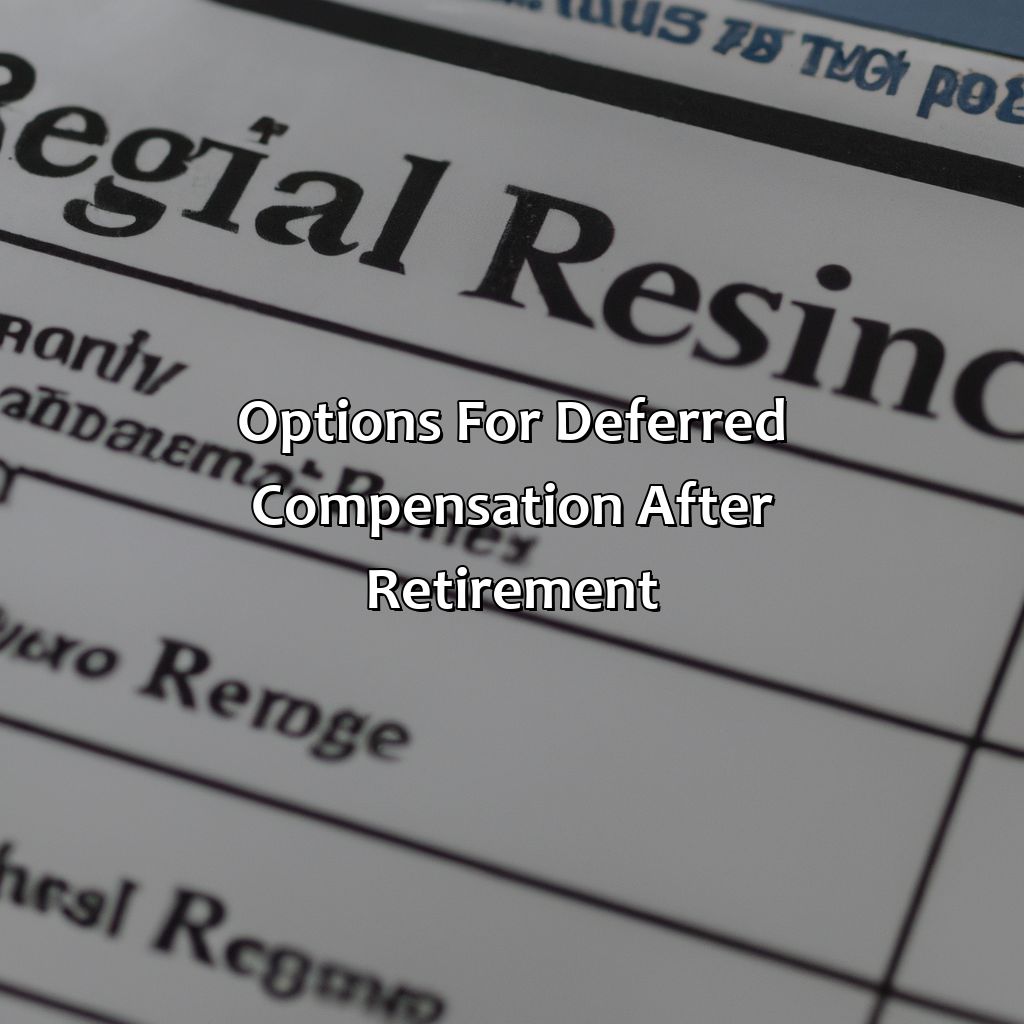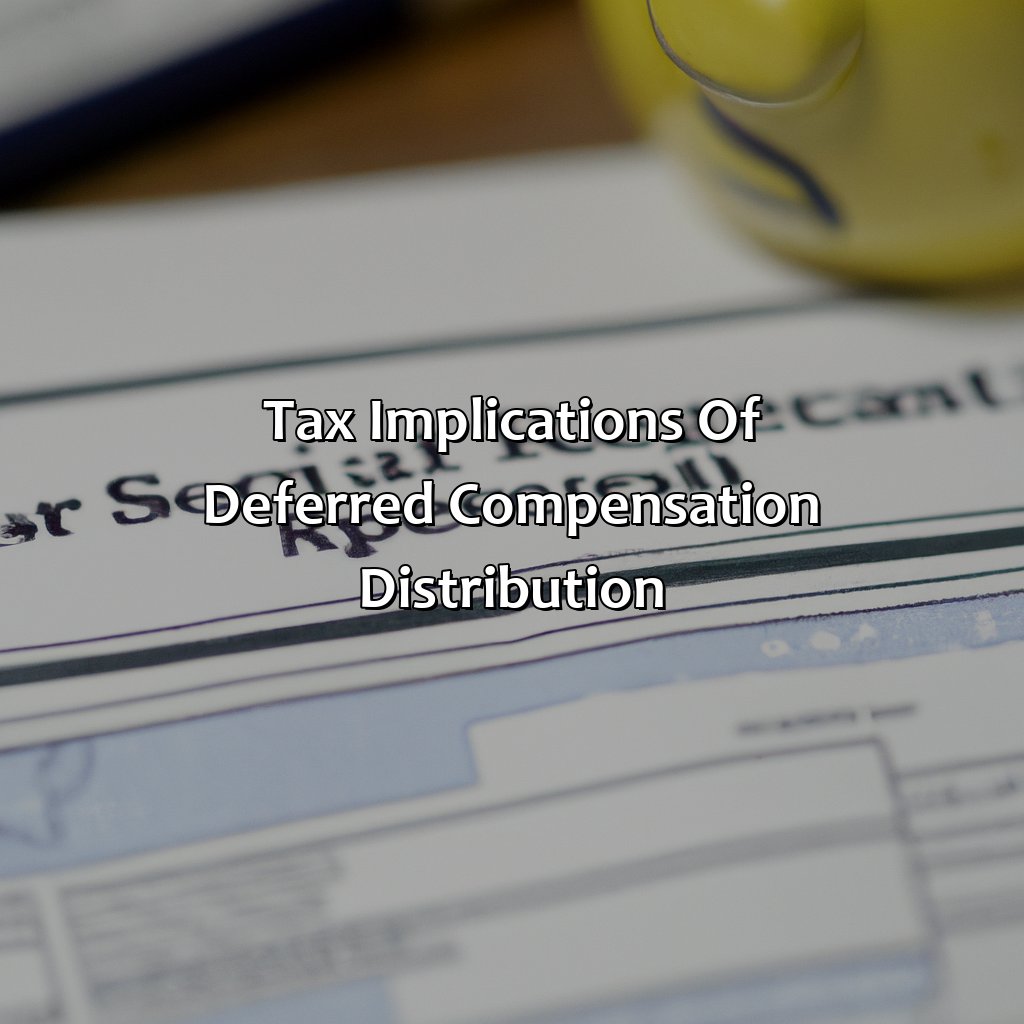What To Do With Deferred Comp After Retirement?
Key takeaways:
- Deferred compensation is a retirement plan where an employee can defer a portion of their compensation until after retirement, allowing for potentially advantageous tax treatment
- Options for deferred compensation after retirement include taking a lump sum payment, scheduled payments, rolling over to an IRA, or delaying distribution
- It is important to consider the tax implications of deferred compensation distribution and consult with a financial advisor to ensure the best strategy for your financial goals
Are you looking for secure options to invest your deferred compensation after retirement? This article provides key insights on the best strategies to maximize your post retirement assets. You can make the most of your deferred comp investments with the help of these strategies.
What is deferred compensation?
Deferred compensation can be defined as a plan in which an employee agrees to set aside a portion of their income for later retrieval. This can include stock options or retirement plans that are not immediately accessible. The employee benefits from this arrangement by deferring a portion of their income until a later date, potentially lowering their tax burden and providing long-term savings opportunities. Deferred compensation plans are often offered by high-paying employers as an additional benefit.
When an employee reaches retirement age, they may wonder what to do with their deferred compensation. One option is to take the funds as a lump sum payment, which may result in a large taxable income. Another option is to receive regular payments over time, potentially lowering the overall tax burden. Employees should consult with a financial advisor to determine the best course of action based on their individual circumstances.
It is important to note that deferred compensation plans can be subject to complex rules and regulations that differ from traditional retirement plans. Employers must ensure that their plans comply with all relevant laws to avoid penalties and legal issues.
In a notable case in 2018, the University of Southern California faced criticism and a lawsuit after it was discovered that their deferred compensation plan did not comply with IRS regulations. The university was forced to reimburse affected employees for tax penalties and lost investment earnings.
In summary, deferred compensation can be a valuable tool for employees looking to defer income and save for the future. However, it is important for both employees and employers to carefully navigate the complex rules and regulations surrounding these plans to avoid legal issues.

Image credits: retiregenz.com by Yuval Jones
Options for deferred compensation after retirement
Retirement time? Consider these potential deferred compensation options:
- Lump sum payment
- Scheduled payments
- Rolling over to an IRA
- Delaying distribution
All could be the right choice!

Image credits: retiregenz.com by David Woodhock
Lump sum payment
Opting for a one-time payment of your deferred compensation after retiring is known as a ‘lump-sum payment’. This can be an attractive option for those who want to receive their full benefits at once instead of having it stretched over many years. However, it is critical to assess the tax implications and financial risks associated with this decision.
When you choose a lump sum payment, you transfer your deferred compensation into your retirement account or other investments. It’s critical to remember that large withdrawals may push you into higher tax brackets, increasing your overall tax liability. Additionally, if the investment options chosen do not perform well, your income may decrease over time. Hence, understanding the various limitations of opting for a lump sum payout is crucial.
Of course, there are other options available that may suit some retirees better than others. Before settling on any plan, make sure you consult with professionals about what option works best for your specific financial circumstances.
Research has shown that more than 60% of organizations offer deferred compensation plans for their employees with some unique features such as “rollover” ones – which may provide you with additional flexibility in selecting a suitable retirement plan that aligns with your needs and expectations.
Get ready for the ultimate delayed gratification with scheduled payments for your deferred compensation – it’s like waiting for Christmas morning every month!
Scheduled payments
For those considering options for their retirement funds, one consideration may be scheduled compensation payments. These recurring payments are typically arranged during employment and can continue into retirement. Here’s what to keep in mind:
- Check your plan documents: Before making any decisions, review the details of your deferred compensation plan documents to understand the structure of your payouts.
- Analyze tax implications: Depending on when you receive these payments, they may have different tax implications that can affect your overall financial strategy.
- Consider payment options: Depending on the terms of your agreement, there may be different options for receiving scheduled payments post-retirement such as lump-sum or installment payouts.
- Talk with a financial advisor: With multiple factors at play, consulting with a financial advisor about potential outcomes and strategies can ensure a smoother transition into retirement.
It’s worth noting that any changes to structured compensation plans should be taken with caution- it’s crucial to consider all potential consequences before making any significant shifts in investment strategies or payout schedules.
Pro Tip: Understanding the taxes and timing associated with structured compensation plans can help you make informed decisions about how to optimize your retirement finances.
When it comes to rolling over your deferred compensation to an IRA, remember: don’t put all your eggs in one retirement basket, unless that basket is filled with delicious investment gains.
Rolling over to an IRA
One option for managing deferred compensation after retirement is transferring it to an Individual Retirement Account (IRA). An IRA allows for continued tax-deferred growth and provides greater control over investment choices. It also offers more flexibility in making withdrawals, which can be helpful in retirement.
Rolling over to an IRA involves setting up a new account and transferring the deferred compensation into it. This can be done either through a direct transfer or by first receiving a distribution of the funds and then depositing them into the IRA within 60 days. It’s important to follow IRS rules and regulations to avoid penalties and taxes.
In addition, rolling over to an IRA can also provide potential estate planning benefits, such as allowing beneficiaries to inherit the funds without being subject to immediate taxation.
According to Forbes, “Retiring with assets held mainly in pre-tax accounts like traditional IRAs or 401(k)s places several limitations on your income.” Therefore, it’s important to consider all options for managing deferred compensation after retirement, including rolling over to an IRA.
Why retire now when you can delay distribution and enjoy the thrill of financial suspense?
Delaying distribution
When deferring distribution of your retirement compensation, you can choose to receive it at a later date. This can help reduce taxes and provide future financial security. It’s essential to understand the plan’s terms and conditions, including how distributions will be made, what triggers them, and any penalties for early distribution. Consult with your financial advisor regarding the best deferred compensation option that aligns with your retirement goals.
Additionally, some employers may offer investment options within their deferred compensation plans. You may want to consider investing in stocks or bonds to increase your potential earnings. However, keep in mind that this also involves risks.
It’s worth noting that delaying distribution may not always be the best option. For example, if you expect higher taxes in the future or are concerned about estate planning implications, immediate distribution may be more advantageous.
To ensure optimal management of your deferred compensation after retirement, stay informed about plan updates and changes. Discuss this option with your tax advisor for insight on how it affects your overall financial plan and avoid missing out on its potential benefits.
Don’t let the IRS rain on your deferred comp parade – be prepared for the tax implications of distribution.
Tax implications of deferred compensation distribution
When it comes to the distribution of deferred compensation, it is crucial to understand the tax implications to avoid any unexpected financial impact. The tax treatment of deferred compensation may vary based on the type and timing of distribution. Therefore, it is recommended to consult a tax specialist before taking any action.
Possible alternative heading: Understanding Taxation on Deferred Compensation Distribution.
It is important to note that the deferred compensation distribution is subject to income tax at the time of payment, and in certain cases, it may incur additional taxes and penalties. Different rules apply to qualified and non-qualified deferred compensation plans. For qualified plans, the distribution is subject to ordinary income tax rates, whereas, for non-qualified plans, the distribution may be subject to a different tax rate or deferred compensation tax.
It is worth noting that the timing of the distribution impacts the tax liability for the recipient. If the compensation is deferred over several years, the recipient’s tax rate could increase upon distribution due to higher income brackets, resulting in a higher tax liability.
According to Forbes, “Employers may use deferred compensation plans to deliver performance-based compensation or to supplement top executives’ retirement savings.”

Image credits: retiregenz.com by Adam Arnold
Some Facts About What To Do With Deferred Comp After Retirement:
Deferred compensation plans are a form of retirement savings that allow employees to defer a portion of their income until retirement. (Source: Investopedia)
Upon retirement, employees may opt to receive deferred compensation as a lump sum or receive payments over a period of time. (Source: The Balance)
Some deferred compensation plans may have restrictions on when and how funds can be withdrawn. (Source: IRS)
In some cases, employees may have the option to roll over deferred compensation into an individual retirement account (IRA) or other qualified retirement plan. (Source: Nolo)
It is important for employees to carefully review their deferred compensation plan and consult with a financial advisor before making any decisions about what to do with their funds after retirement. (Source: The Motley Fool)
FAQs about What To Do With Deferred Comp After Retirement?
What is deferred compensation and what are my options for it after retirement?
Deferred compensation refers to money that an employee has elected to defer receiving as part of their compensation package. There are several options available for what to do with this deferred compensation after retirement, including taking it as a lump sum, opting for regular payouts over a set period of time, or rolling it over into an Individual Retirement Account (IRA).
How do I decide which option is best for me?
The best option for you depends on your individual financial situation and priorities. Consider factors such as your current income needs, tax implications, and retirement goals. It may be helpful to consult with a financial advisor to determine which option aligns with your long-term financial plan.
What are the tax implications of each option?
Taking a lump sum distribution of deferred compensation will typically result in a large one-time tax hit. Regular payouts over a set period of time may be more tax-efficient, as the payments are spread out over time. Rolling the deferred compensation into an IRA can also provide tax benefits, as long as it is done correctly.
What happens to my deferred compensation if I pass away before it is paid out?
The rules around what happens to deferred compensation after the holder passes away can vary depending on individual circumstances and the terms of the compensation plan. In some cases, the deferred compensation may be paid out to designated beneficiaries, while in other cases, it may revert back to the employer.
What if I need access to the deferred compensation before retirement?
Accessing deferred compensation prior to retirement can be challenging, as it is typically subject to strict rules around when and how it can be paid out. However, in certain circumstances, such as financial hardship, it may be possible to receive early distribution. Reach out to your employer or plan administrator to discuss your options.
What if I have deferred compensation in multiple accounts or plans?
If you have deferred compensation in multiple accounts or plans, it may be beneficial to consolidate them for easier management and greater control over your retirement income. Consider rolling all of your deferred compensation into a single IRA, or consolidating them within your current employer’s plan if possible.
 Checkout this IRS Loophole
Checkout this IRS Loophole 




